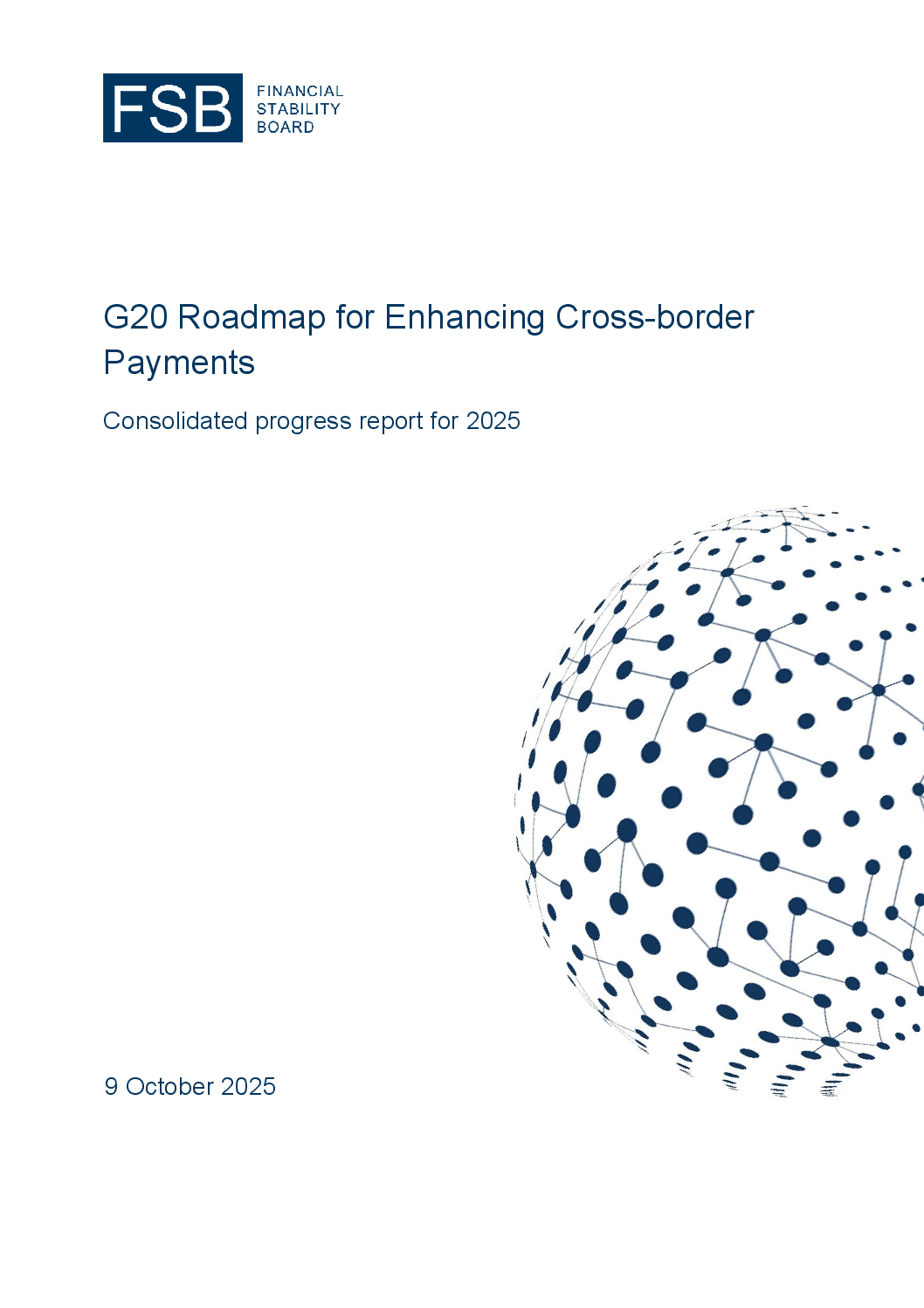Press enquiries:
+41 61 280 8477
[email protected]
Ref: 15/2025
- The FSB and partner organisations have completed most of the international policy work under the G20 Roadmap for enhancing cross-border payments.
- Policy initiatives have not yet translated into the desired real-world gains for end-users, though there have been improvements in some areas.
- In order to fulfil the G20 objectives, the FSB and partner organisations will work with key stakeholders to support implementation of actions under the Roadmap at the jurisdictional level.
The Financial Stability Board (FSB) today published a consolidated progress report for 2025 on the actions taken by the FSB, the Bank for International Settlements Committee on Payments and Market Infrastructures (CPMI) and other partner organisations under the G20 Roadmap for Enhancing Cross-Border Payments. To more effectively monitor progress, the annual progress report has been integrated with the report on key performance indicators (KPIs).
Over the past year several significant milestones have been achieved. These include the FSB’s recommendations to level the playing field between bank and non-bank payment services providers and to mitigate data-related frictions in cross-border payments, and the Financial Action Task Force (FATF)’s revision of standards for data in cross-border payments (Recommendation 16 on Payment Transparency). While the majority of the Roadmap actions have been completed, these efforts have not yet translated into tangible improvements for end-users at the global level.
It is unlikely that satisfactory improvements at the global level will be achieved in line with the 2027 Roadmap timetable. The global speed of wholesale payments has increased, possibly laying the foundation for faster retail payments and remittances in the future. The speed of remittances has also improved globally, which means those end-users relying on financial support from family members abroad are receiving payments more quickly. However, the average global cost of such payments remains high, notwithstanding some improvements in the most expensive regions.
There continues to be significant variations across regions. More needs to be done at the regional and jurisdictional level to turn the international policy work into real-world gains for end-users and to support economic growth. Individual jurisdictions need to take practical steps to implement measures that will have downstream benefits. Private sector stakeholders should also explore and implement changes to improve the end-user’s cross-border payments experience.
“The FSB and South African G20 Presidency remain committed to achieving the goals of the Roadmap and urge the public and private sectors to make tangible improvements to domestic payment systems as the first and last mile of a cross-border payment depend on domestic payment rails”, said Lesetja Kganyago, Governor of the South African Reserve Bank and Co-Chair of the FSB Cross-border Payments Coordination Group.
Over the coming year, the FSB and other partner organisations will focus on enhancing monitoring and supporting implementation of the agreed policy recommendations under the G20 Roadmap. “We are committed to facilitating implementation of agreed policy recommendations and to engage actively with the private sector, G20 and non-G20 jurisdictions to make this happen,” said Fabio Panetta, Governor of Banca d’Italia, Chair of the CPMI and Co-Chair of the FSB Cross-border Payments Coordination Group.
Notes to editors
In 2020, the Saudi Arabian G20 Presidency made enhancing cross-border payments a priority and asked the FSB to develop and coordinate a G20 Roadmap. To give impetus to this work, the FSB, in collaboration with the CPMI and other partner organisations, developed a prioritisation plan that focused on actions that would most effectively contribute to achieving the goals of the Roadmap for faster, cheaper and more transparent and accessible cross-border payments. To give ambition and accountability to the Roadmap’s goals, in 2021, the G20 endorsed a set of global quantitative targets, the majority of which are set for end-2027. To more effectively monitor progress, the annual progress report has been integrated with the report on KPIs measuring the end-user experience.
The FSB coordinates at the international level the work of national financial authorities and international standard-setting bodies and develops and promotes the implementation of effective regulatory, supervisory, and other financial sector policies in the interest of financial stability. It brings together national authorities responsible for financial stability in 24 countries and jurisdictions, international financial institutions, sector-specific international groupings of regulators and supervisors, and committees of central bank experts. The FSB also conducts outreach with approximately 70 other jurisdictions through its six Regional Consultative Groups.
The FSB is chaired by Andrew Bailey, Governor of the Bank of England. The FSB Secretariat is located in Basel, Switzerland and hosted by the Bank for International Settlements.
